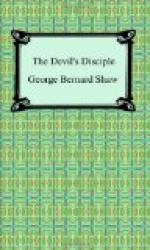Christy (with a slow, bovine cheerfulness, after a pause). I think it’s going to be a fine morning, after all.
Mrs. Dudgeon (railing at him). A fine morning! And your father newly dead! Where’s your feelings, child?
Christy (obstinately). Well, I didn’t mean any harm. I suppose a man may make a remark about the weather even if his father’s dead.
Mrs. Dudgeon (bitterly). A nice comfort my children are to me! One son a fool, and the other a lost sinner that’s left his home to live with smugglers and gypsies and villains, the scum of the earth!
Someone knocks.
Christy (without moving). That’s the minister.
Mrs. Dudgeon (sharply). Well, aren’t
you going to let Mr.
Anderson in?
Christy goes sheepishly to the door. Mrs. Dudgeon buries her face in her hands, as it is her duty as a widow to be overcome with grief. Christy opens the door, and admits the minister, Anthony Anderson, a shrewd, genial, ready Presbyterian divine of about 50, with something of the authority of his profession in his bearing. But it is an altogether secular authority, sweetened by a conciliatory, sensible manner not at all suggestive of a quite thoroughgoing other-worldliness. He is a strong, healthy man, too, with a thick, sanguine neck; and his keen, cheerful mouth cuts into somewhat fleshy corners. No doubt an excellent parson, but still a man capable of making the most of this world, and perhaps a little apologetically conscious of getting on better with it than a sound Presbyterian ought.
Anderson (to Christy, at the door, looking at Mrs. Dudgeon whilst he takes off his cloak). Have you told her?
Christy. She made me. (He shuts the door; yawns; and loafs across to the sofa where he sits down and presently drops off to sleep.)
Anderson looks compassionately at Mrs. Dudgeon. Then he hangs his cloak and hat on the rack. Mrs. Dudgeon dries her eyes and looks up at him.
Anderson. Sister: the Lord has laid his hand very heavily upon you.
Mrs. Dudgeon (with intensely recalcitrant resignation). It’s His will, I suppose; and I must bow to it. But I do think it hard. What call had Timothy to go to Springtown, and remind everybody that he belonged to a man that was being hanged?—and (spitefully) that deserved it, if ever a man did.
Anderson (gently). They were brothers, Mrs. Dudgeon.
Mrs. Dudgeon. Timothy never acknowledged him as his brother after we were married: he had too much respect for me to insult me with such a brother. Would such a selfish wretch as Peter have come thirty miles to see Timothy hanged, do you think? Not thirty yards, not he. However, I must bear my cross as best I may: least said is soonest mended.
Anderson (very grave, coming down to the fire to stand with his back to it). Your eldest son was present at the execution, Mrs. Dudgeon.




